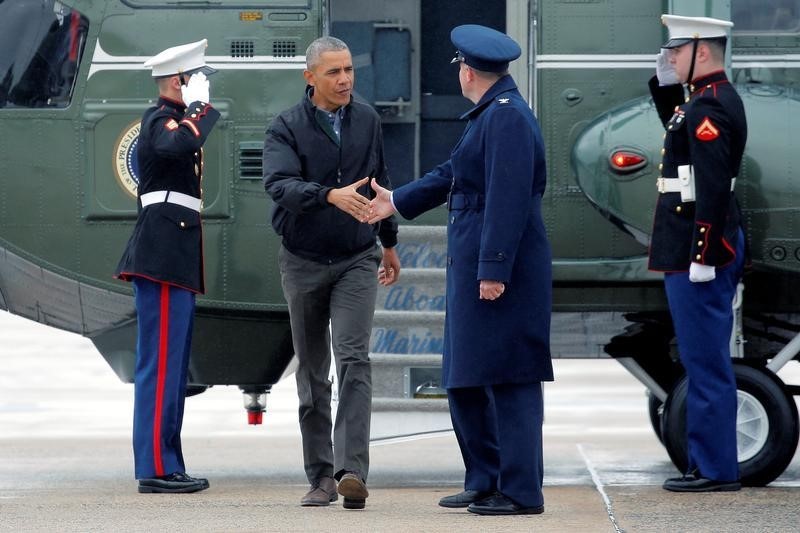By Matt Spetalnick
ABOARD AIR FORCE ONE (Reuters) - U.S. President Barack Obama on Sunday headed for his first visit to Vietnam, a trip aimed at sealing the transformation of an old enemy into a new partner to help counter China’s growing assertiveness in the region.
Four decades after the Vietnam War, Obama – the first U.S. leader to come of age after a conflict that bitterly divided America - will seek to deepen defence and economic ties with the country’s communist government while also prodding them on human rights, aides say.
Pressure has mounted for Obama to use his landmark visit, which begins on Monday, to roll back a 32-year-old arms embargo on Hanoi, one of the last vestiges of wartime animosity.
Lifting the ban - something Vietnam has long sought - would anger Beijing, which resents U.S. efforts to forge stronger military bonds with its smaller neighbours at a time of rising tensions in the disputed South China Sea. But there was no immediate word of a final U.S. decision on the issue.
Vietnam’s poor human rights record remains a possible sticking point, but the Obama administration appears increasingly swayed toward giving Hanoi some leeway to build its deterrent against China.
“Nobody has any illusions," said Evan Medeiros, Obama’s former top Asia adviser. "This trip sends important signals to China about U.S. activism in the region and growing U.S. concern about Chinese behaviour."
Closer military cooperation with allies and partners has been a major thrust of Obama’s strategic “rebalance” toward the Asia-Pacific region, a centrepiece of his foreign policy.
Obama’s Vietnam visit comes just days after Chinese fighter jets carried out what the Pentagon said was an "unsafe" intercept of a U.S. military reconnaissance plane in the South China Sea. Beijing is pursuing territorial claims there that conflict with those of Vietnam and several other countries.
'UPGRADE' OF RELATIONS
Obama will be the third consecutive U.S. president to visit Vietnam since diplomatic relations were restored in 1995.
"What we want to demonstrate with this visit is a significant upgrade in the relationship between the United States and Vietnam ... even as we have areas of difference," said Ben Rhodes, Obama’s deputy national security adviser.
Washington wants Vietnam to open up more on the economic front and also move closer militarily, including increased port visits by U.S. warships, possibly with access to the strategic harbour at Cam Ranh Bay, U.S. officials say.
But even as the two sides look forward, there will be reminders of the past. Obama will be accompanied by Secretary of State John Kerry, who after a tour in Vietnam as a young Navy officer burst onto the scene as an antiwar protester in the 1970s.
At the first stop of Obama's three-day visit, Hanoi, the seat of communist rule, he will meet Vietnam's new president, Tran Dai Quang, its new prime minister, Nguyen Xuan Phuc, and Communist Party General Secretary Nguyen Phu Trong.
Obama won’t be able to avoid prominently displayed images and busts of the late Vietnamese leader Ho Chi Minh, revered by many of his compatriots but widely reviled in the United States during the war. The conflict involving U.S. combat forces was estimated to have killed hundreds of thousands of Vietnamese and 58,000 American troops.
In the country’s commercial hub, Ho Chi Minh City, formerly Saigon, Obama will meet entrepreneurs, a chance to tout Hanoi’s role in a trans-Pacific trade pact he has championed.
But the name of the city, the capital of South Vietnam during the war, evokes searing images for many Americans of a final frantic U.S. airlift in 1975.
While Vietnam wants warmer ties, some officials are suspicious that the United States seeks to undermine their one-party rule.

Obama plans to meet dissidents amid U.S. concerns about the government's heavy-handedness toward opponents. Hanoi released a Catholic priest, one of its longest-serving prisoners, on Friday, in a possible gesture ahead of Obama's visit.